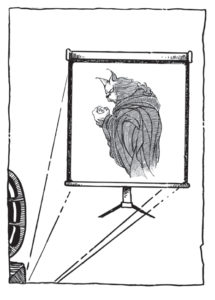“Groups always have a fluid, amorphous but highly vulnerable group “ego.” Moreover, that fluid, amorphous group ego is always highly susceptible to the manipulation of a charismatic leader. Charismatic madness touches and activates the “mad parts” in otherwise quite sane people. Psychological contagions, Shadow plagues, do occur, and few of us, if any, are exempt.” —James Hollis, Why Good People Do Bad Things
“Hate has a lot in common with love, chiefly with that self-transcending aspect of love, the fixation on others, the dependence on them, and in fact the delegation of a piece of one’s own identity to them… the hater longs for the object of his hatred.” —Vaclav Havel, The Shadow in America
“If we do not see our own shadow, we project it onto other people, who then have a fascinating effect on us. We are compelled to think about them all the time; we get disproportionately stirred up about them and may even start to persecute them. This does not mean that certain people whom we hate are not in truth intolerable; but even in such cases we could deal with them in a reasonable manner or avoid them—if they were not the projection of our own shadow, which never fails to lead us into every possible exaggeration and fascination.”—Marie-Louise von Franz, Archetypal Dimensions of the Psyche
“A predominant behavior characteristic of those I would call evil is scapegoating. Because in their hearts they consider themselves above reproach, they must lash out at anyone who does reproach them. They sacrifice others to preserve their image of self-perfection. Since deep down they feel themselves to be faultless, it is inevitable that when they are in conflict with the world they will perceive the conflict as the world’s fault. Since they must deny their own badness, they must perceive others as bad. They project their own evil onto the world. They never think of themselves as evil; on the other hand, they consequently see much evil in others.”—M. Scott Peck, from “Healing Human Evil,” in Meeting the Shadow
“The collective Shadow can take form as mass phenomena in which entire nations become possessed. When a minority is forced to carry the projection of what a majority of the society denies about itself, the potential for great evil is activated.”—Connie Zwieg and Jeremiah Abrams, Meeting the Shadow
“Consider the convenience of knowing who the enemy is, always. If the enemy is there, they are not here, so I have no burden of consciousness, no obligation of self-examination.”—James Hollis, Why Good People Do Bad Things
“If there are some things you just can’t stand to admit about yourself, if you just can’t face some of your own stuff, then you’ll see your own stuff on someone else’s face. It’s called projection, and it happens all the time. It starts with denial, and it ends in blame. We take some part of ourselves we don’t like—or are ashamed of, or don’t want to think about, or can’t bring ourselves to deal with—and then we project it out onto another person, whom we then condemn vociferously.
Imagine a movie projector. You’d be the projector whirring in that little room up at the back of the theater, and the other person would be the big screen down in front. You’re creating the image. The image is being produced inside your head, but the other person is the only place where you can actually see that image. Projection.
Thus we can hate someone else for having whatever quality we’re projecting, while remaining steadfastly in love with ourselves and not having to change a thing personally. “I don’t have a bad temper. What are you talking about, you asshole? YOU have a TERRIBLE temper!!*#%* —Kay Plumb, Shadow in the USA
“Projection of shadow material causes most of the misery, injustice and warfare in the world.”—Robert Bly, A Little Book on the Human Shadow
